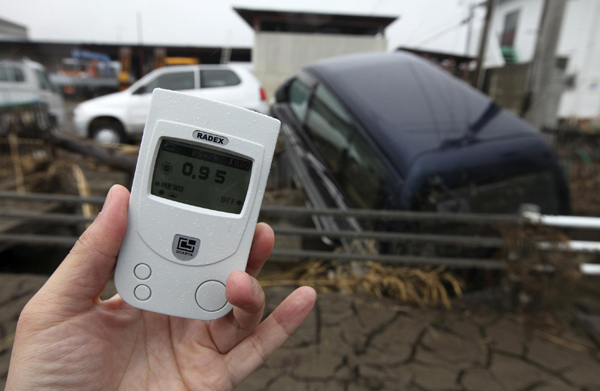Nuclear Meltdown
Japan to pump radioactive water until Sunday
(Agencies)
Updated: 2011-04-09 16:35
 |
Large Medium Small |
TOKYO - Japan will pump radioactive water into the sea from a crippled nuclear plant until Sunday, a day later than previously planned, its nuclear safety agency said.
The announcement came a day after China expressed concern at the discharge of contaminated water from the Fukushima Daiichi plant smashed by last month's earthquake, reflecting growing international unease over the month-long nuclear crisis.
 A radiation monitor indicates 0.95 microsieverts per hour at an area hit by the March 11 earthquake and tsunami, which is about 20km (12 miles) from the damaged Fukushima nuclear power station, in Minamisoma, Fukushima prefecture, April 9, 2011. [Photo/Agencies]? |
| ||||
"We are working on releasing water ... we are likely to finish this tomorrow," Hidehiko Nishiyama, a deputy director- general at Japan's Nuclear and Industrial Safety Agency, told reporters on Saturday.
Plant operator Tokyo Electric Power Co (TEPCO) said earlier it expected to stop pumping tainted water into the sea on Saturday, but work was interrupted by a powerful aftershock on Thursday.
TEPCO is struggling to contain the worst atomic crisis since Chernobyl. Engineers say they are far from in control of the damaged reactors and it could take months to stabilise them and years to clear up the toxic mess left behind.
Nuclear reactor maker Toshiba Corp has proposed a 10-year plan to decommission four of the six damaged reactors at the plant, 240 km (150 miles) north of Tokyo, said Kyodo news agency.
But the government has said it was too early to have a "specific road map" for ending the crisis.
The magnitude 9 earthquake and tsunami on March 11 left 28,000 people dead or missing, and northeastern Japan a splintered wreck.???????
More than 153,000 people affected by the tsunami and radiation are living in school gymnasiums and other evacuation centres, according to the National Police Agency. Several tsunami-damaged cities have begun moving families into temporary housing, NHK state television said.
Banri Kaieda, a minister whose portfolio includes the nuclear industry, said he hoped evacuees from the radiation zone in Fukushima could visit their homes as soon as possible.
Japan has made evacuation mandatory for people living within a 20 km (12-mile) radius of the crippled reactor and urged those living between 20 km and 30 km from the plant to stay indoors. ?
"There were expectations among the evacuees that they could return to their homes for one night, but they will only be able to stay for a few hours to gather their personal belongings," Kaieda was quoted by Jiji news agency as saying in Fukushima.???
GLOBAL RADIATION CONCERNS
Several countries have restricted food imports from Japan over radiation fears as Japan's economy reels from the country's worst disaster since World War Two.
Food is a tiny part of Japan's export-oriented economy, but disruptions to its manufacturing and electronics supply chains are reverberating around the world.
China will ban imports of farm produce from 12 areas in Japan, China's quarantine authority said.
China said earlier it had detected 10 cases of ships, aircraft or cargo arriving from Japan with higher than normal levels of radiation since mid-March.
Xinhua also reported trace levels of radioactivity had been detected in 22 Chinese provinces.
On Friday, China said it would closely monitor Japan's actions to regain control of the plant and demanded Tokyo provide swift and accurate information on the crisis.
South Korea has also criticised Japan, accusing it of incompetence for failing to notify its neighbours that it would pump radioactive water into the sea.
Radiation from Japan spread around the entire northern hemisphere in the first two weeks of the nuclear crisis, according to the Vienna-based Preparatory Commission for the Comprehensive Nuclear-Test-Ban Treaty Organisation.
ECONOMY REELING
The world's third largest economy is now in a "severe condition," the government said on Friday.
Finance leaders of the G20 group of countries will ask Tokyo for a plan to resuscitate its economy as they see the damage from the earthquake as a risk to global growth, Takatoshi Kato, a former IMF deputy managing director, told Reuters on Friday.
Automaker Toyota Motor Corp plans to idle some of US plants late in April, while Honda Motor Co Ltd has extended reduced US production until April 22.
Power blackouts and restrictions, factory shutdowns, and a sharp drop in tourists have hit the world's most indebted nation, which is facing a damages bill as high as $300 billion, making it by far the world's costliest natural disaster.
Economists expect Japan to slip into recession this year.
In an obvious sign of the downturn, taxis park in long lines in central Tokyo each night, their drivers staying warm by idling the motor as they wait forlornly for a fare.
Thursday's aftershock, measured at a revised magnitude of 7.1 by Japan's meteorological agency, forced two electronics firms including Sony to stop production because of power cuts.
On a brighter note, Japan's top automakers Toyota and Nissan Motor Co said they planned to resume production at all domestic factories in stages starting on Monday, although output levels would be at half of original plans.
| 分享按鈕 |



